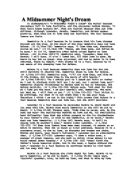To contemplate this further, I looked into the ‘invisible’ motives that the characters could harbor for their ends to be met. Supposing Hermia was excessively controlled by her father from a younger age, which is very likely considering his personality and the obligation of Athenian law, then eloping with Lysander might just be the way to gain her opposition. Correspondingly, in Lyander’s case, his contempt for Athen’s law leads him to Hermia. And thus we have our lovely main couple.
In Helena and Demetrius’ case, however, this is different. Both Helena and Demetrius are provoked by their inner conscience into submission rather than opposition. Although at the start of the play their involvement comes to surface, it is not made clear whether they had intercourse or not. It is possible that their sense of inferiority developed due to premature biological maturity but then again it is also possible that Demetrius preferred to conform to Egeus’ expectations of marrying Hermia. What follows from there is probably Helena’s sense of inferiority at Hermia having both Demetrius and Lysander’s affections to herself. This composes the basis for the most developed character during the course of this play: Helena.
Taking Helena’s persona in close detail, we can a construct a woman, with an inferiority complex who is envious of her sister-like friend. Back in those days, females were seconded to males’ opinions, so they had to submit. Flashes of gender roles are exhibited in Demetrius, who openly professes his love for another woman, and Helena, who can’t choose but accept unrequited love as a tool of self-destruction to keep her identity intact. Revealing to Demetrius the plans that Hermia and Lysander predisposed to her might have just been an outlet for her repressed jealousy. Similarly, every character seeks to protect himself from his own truth while trying to find significance in their identities.
Continuing: although Helena abjection to Lysander’s profession later in the play seems reasonable; her rejection to Demetrius is highly illogical seeing as the sole purpose she went about, seeking, was his love. That’s why she fell into confusion: because of the discrepancy between her cast off dream of being with Demetrius and the reality that surrounds her. Her inferiority answers: this must be a hoax.
But seeing the two men chasing after her, her pride is restored. And after the final rest, her mind comes to order with accepting love and loving instead. In the epitome, it is shown that only Demetrius actually required the potion for the events to come to order. It may be because his mind was abnormal to the cause: trying to win over both the maidens, so external interference was essential.
Bottom’s reaction to his experience was much more different compared to the leading lovers. Instead of being controlled by the perception of a dream, he derived a sort of reality from it and made use of it in his ballad. Trying to adapt to the illusionary world of dramatizing must have helped him come into terms with it; as every experience whether real or imaginary can teach us something. All that matters is how we view it.
At the end of the forest scene, when Thesus overrules Egeus’ order, he satisfies the condition for both our main characters to get a happy ending. Lysander gets to witness Athenian law being broken and Hermia gets to force her way over her father’s decision. This, under the guise of triumphed love, is all well for us to enjoy and for the characters to play.








